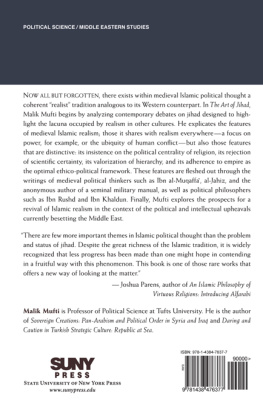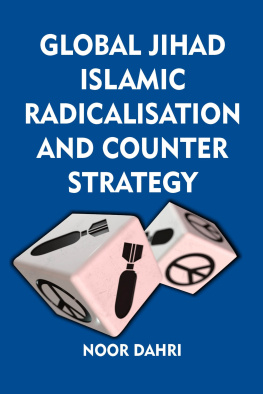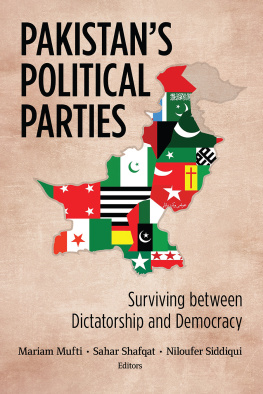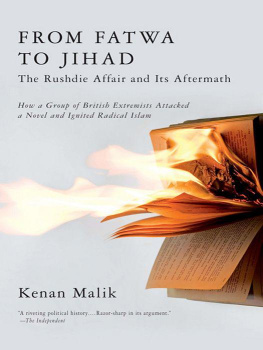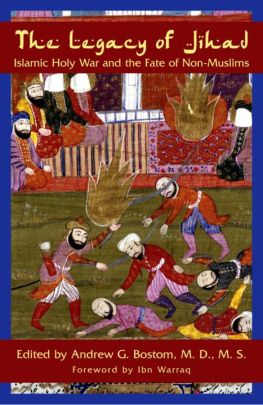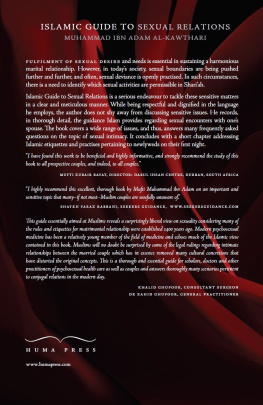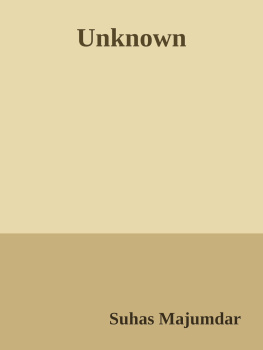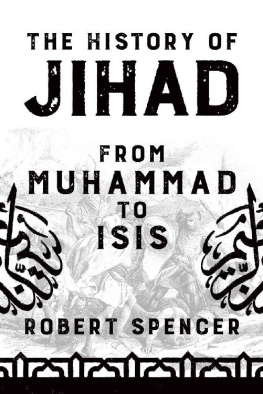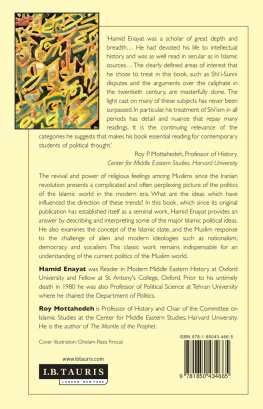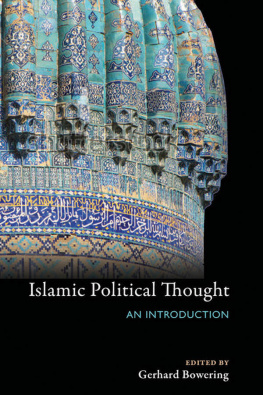Malik Mufti - The Art of Jihad: Realism in Islamic Political Thought
Here you can read online Malik Mufti - The Art of Jihad: Realism in Islamic Political Thought full text of the book (entire story) in english for free. Download pdf and epub, get meaning, cover and reviews about this ebook. year: 2019, publisher: State University of New York Press, genre: Romance novel. Description of the work, (preface) as well as reviews are available. Best literature library LitArk.com created for fans of good reading and offers a wide selection of genres:
Romance novel
Science fiction
Adventure
Detective
Science
History
Home and family
Prose
Art
Politics
Computer
Non-fiction
Religion
Business
Children
Humor
Choose a favorite category and find really read worthwhile books. Enjoy immersion in the world of imagination, feel the emotions of the characters or learn something new for yourself, make an fascinating discovery.
- Book:The Art of Jihad: Realism in Islamic Political Thought
- Author:
- Publisher:State University of New York Press
- Genre:
- Year:2019
- Rating:5 / 5
- Favourites:Add to favourites
- Your mark:
- 100
- 1
- 2
- 3
- 4
- 5
The Art of Jihad: Realism in Islamic Political Thought: summary, description and annotation
We offer to read an annotation, description, summary or preface (depends on what the author of the book "The Art of Jihad: Realism in Islamic Political Thought" wrote himself). If you haven't found the necessary information about the book — write in the comments, we will try to find it.
Malik Mufti: author's other books
Who wrote The Art of Jihad: Realism in Islamic Political Thought? Find out the surname, the name of the author of the book and a list of all author's works by series.
The Art of Jihad: Realism in Islamic Political Thought — read online for free the complete book (whole text) full work
Below is the text of the book, divided by pages. System saving the place of the last page read, allows you to conveniently read the book "The Art of Jihad: Realism in Islamic Political Thought" online for free, without having to search again every time where you left off. Put a bookmark, and you can go to the page where you finished reading at any time.
Font size:
Interval:
Bookmark:


The Art of Jihad
The Art of Jihad
Realism in Islamic Political Thought
MALIK MUFTI

Cover art: iStock by Getty Images.
Published by State University of New York Press, Albany
2019 State University of New York
All rights reserved
Printed in the United States of America
No part of this book may be used or reproduced in any manner whatsoever without written permission. No part of this book may be stored in a retrieval system or transmitted in any form or by any means including electronic, electrostatic, magnetic tape, mechanical, photocopying, recording, or otherwise without the prior permission in writing of the publisher.
For information, contact State University of New York Press, Albany, NY
www.sunypress.edu
Library of Congress Cataloging-in-Publication Data
Names: Mufti, Malik, author.
Title: The art of jihad : realism in Islamic political thought / Malik Mufti.
Description: Albany : State University of New York Press, Albany, 2019. | Includes bibliographical references and index.
Identifiers: LCCN 2018052662 | ISBN 9781438476377 (hardcover : alk. paper) | ISBN 9781438476384 (ebook)
Subjects: LCSH: Islam and politics. | Political realism. | Jihad.
Classification: LCC BP173.7 .M77 2019 | DDC 320.55/7dc23
LC record available at https://lccn.loc.gov/2018052662
10 9 8 7 6 5 4 3 2 1
For my beloved parents, zcan and Zuhayr

Contents
Acknowledgments
I wish to thank Rob Devigne, Leila Fawaz, Ioannis Evrigenis, Kenneth Garden, Louise Marlowe, Tony Smith, Riccardo Strobino, and Vickie Sullivan for their generous help in various aspects of this books preparation. Some sections of
Transliteration Note
I n transliterating Arabic and Turkish words, I have followed the transliteration guidelines of the International Journal of Middle East Studies (https://ijmes.chass.ncsu.edu/ijmes_translation_and_transliteration_guide.htm).
Introduction
A few months after the September 11, 2001 attacks, I had a conversation in Washington with a mid-level government official who belonged to the neoconservative circles pushing for a radically different American approach to the Near East. At one point he said that his office was interested in ways of changing Islamnot, he explained, in the sense of promoting one moderate interpretation or current over others, but of coming up with an entirely new religion. A year later the RAND Corporation published a monograph by Cheryl Benard (wife of Zalmay Khalilzad, subsequently appointed ambassador by President George W. Bush first to Afghanistan and then to Iraq) which began by considering the same question: It is no easy matter to transform a major world religion. If nation-building is a daunting task, religion-building is immeasurably more perilous and complex.
Many Muslims naturally take exception to outsiders seeking to defang their religion, as is further discussed in transformationsculminating in democratizationthat arise primarily from internal dynamics and that will compel Islamic societies, as they have compelled other societies, to reconsider long-held verities. In the face of such transformations, the only alternatives need not be reactionary obstinacy and abject capitulation to alien values. The purpose of this book is to identify a third alternative for Islamic politiesa realist political tradition, as indigenous as can be, that can help them navigate through the current upheaval because it has already anticipated some of the most critical challenges of the emergent culture.
In order to delineate the contours of this realist tradition, and also in the process to clarify the character of the challenges looming ahead, it will be helpful to begin with a brief review of the trajectory taken by its Western counterpart. Like all realisms, the Western tradition sets out from a naturalistic grounding; specifically, from the conviction that a proclivity toward evil inheres in human nature. Left to their own devices, without any restraining influence, human beings are disposed to selfishness and aggression, so that power becomes the primary currency, and conflict the ubiquitous feature, of human affairs. Political communities therefore require the repression or sublimation of such natural drives. Law is the primary mechanism for dealing with this problem, but it does not suffice because the aggressive energies cannot simply be extinguished. Hence the other age-old solution: redirecting them against a common external enemy. United by fear and hostility toward this enemy, the community is better able to sustain the more positive bonds that make decent political life possible.
It is evident that such a solution entails a cooptation, rather than outright rejection, of natural impulses such as ambition, belligerence, and deceit. They are disciplined and redeployed, but not eliminated. They become componentssubordinate but nonetheless indispensableof a greater good. An effective statecraft must therefore be prepared to venture into those gray areas where necessity compels the recruitment of lesser evils against greater ones. Such a solution, moreover, can never be final or definitive, because circumstances never stay the same and the calculus of necessary accommodations constantly changes. Sometimes, for example, a more aggressive temper among the populace is called for; sometimes a more pacific one. Determining what is most needful at any given time, and being able to bring it about, are the chief requirements of realist statecraft.
Until recently, the main counterpart to realism has been what may be called idealism, according to which it is in fact possible to perfect human nature. This is accomplished by introducing into human affairs a code of principles and standards that do not derive from nature, but from an external sourcesuch as divine providence or some other sort of transcendent right or lawcapable of eliminating the aggressive and dominating aspects of the human character, and thereby establishing, here on earth, a permanently harmonious and peaceful order in both domestic and international politics. This transcendent conception of idealism sometimes takes an activist, even militant, form, in line with its conviction that utopia on earth is within reach so long as no accommodations or compromises are made. When confronted by a social environment impervious to its call, however, it can also lead its adherents to retreat from the world into an expectant monasticism.
In the West, realism gained a decisive upper hand over idealism with the advent of the modern secular era, and assumed a primary manifestation congruent with the spirit of the new age: Machiavellianism, an uninhibited embrace of the impulses and appetites of the now fully liberated self; concerned as Machiavelli himself put it with the is rather than the ought , and accordingly focused on the value-free techniques, the science, of pursuing ones own goals. In contrast to premodern realists such as Thucydides who sought to preserve the distinction between noble and base ends, Machiavelli valorized strifebetween factions balanced within a polity, between polities in a multipolar international arenaas well as the qualities of character that strife elicits, for the sake of a notion of greatness that seems, to say the least, unmoored from moral concerns. Life thus becomes a war of all against all devoid of restraint.
Font size:
Interval:
Bookmark:
Similar books «The Art of Jihad: Realism in Islamic Political Thought»
Look at similar books to The Art of Jihad: Realism in Islamic Political Thought. We have selected literature similar in name and meaning in the hope of providing readers with more options to find new, interesting, not yet read works.
Discussion, reviews of the book The Art of Jihad: Realism in Islamic Political Thought and just readers' own opinions. Leave your comments, write what you think about the work, its meaning or the main characters. Specify what exactly you liked and what you didn't like, and why you think so.

